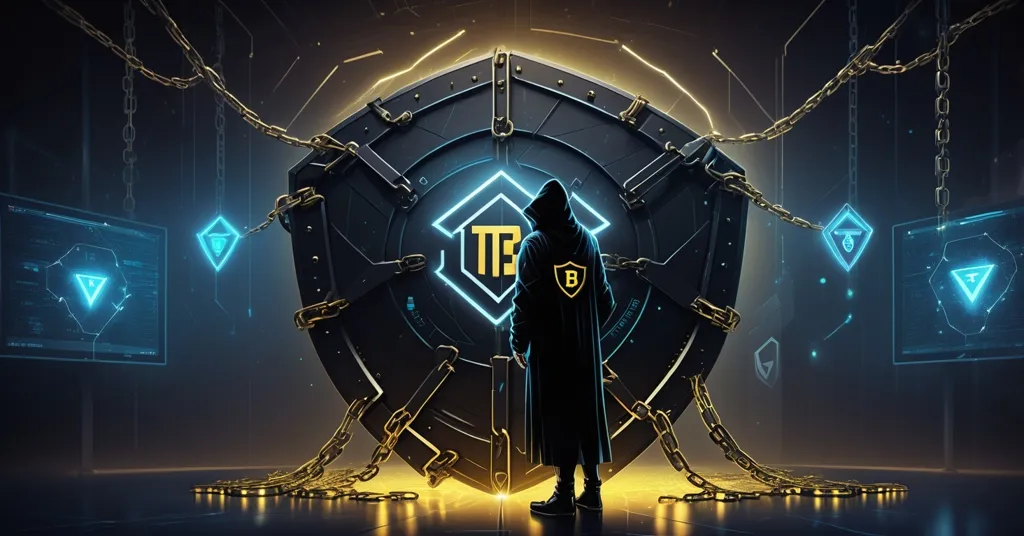T3 FCU Freezes $250M in Crypto Fraud, Launches T3+ with Binance as First Partner

T3 Financial Crime Unit Rolls Out T3+ Program with Binance, Freezes $250M in Crypto Fraud Assets
The T3 Financial Crime Unit (T3 FCU), a joint force of TRON, Tether, and TRM Labs, has dropped a major bombshell in the fight against blockchain crime with the launch of the T3+ Global Collaborator Program on August 12, 2025, in Singapore. With Binance, the world’s largest crypto exchange, stepping in as the first member, and over $250 million in illicit assets frozen globally in under a year, this initiative is a loud wake-up call to scammers exploiting decentralized networks.
- Massive Impact: T3 FCU has frozen over $250 million in criminal assets since September 2024.
- New Collaboration: T3+ program launched, with Binance as the inaugural partner.
- Targeted Strike: Joint effort with Binance froze $6 million tied to a pig butchering scam.
- Broader Vision: Aims to build a safer crypto ecosystem through industry-law enforcement synergy.
T3 FCU’s $250 Million Milestone in Blockchain Security
Formed in September 2024, the T3 Financial Crime Unit emerged as a public-private powerhouse through the collaboration of TRON, a leading blockchain platform, Tether, the dominant stablecoin provider, and TRM Labs, a San Francisco-based blockchain intelligence firm. Their mission? To tackle the seedy underbelly of crypto—money laundering, investment fraud, extortion, terrorism financing, and more. In less than a year, they’ve analyzed over $3 billion in transaction volume across five continents, working hand-in-hand with law enforcement to lock down criminal funds before they disappear into the digital void. Tracking crypto transfers as they happen to spot suspicious activity instantly, their real-time transaction monitoring has led to a staggering $250 million in frozen criminal assets worldwide. That’s not just a number; it’s a direct strike at the heart of blockchain crime, proving that the industry can police itself when push comes to shove.
TRON, a key player in this trio, boasts jaw-dropping stats as of August 2025: over 324 million user accounts, 11 billion transactions, and $27 billion in total value locked (TVL)—a metric reflecting the total amount of assets staked or locked in a blockchain protocol, showcasing its economic clout. On top of that, TRON hosts the largest circulating supply of USDT, Tether’s stablecoin, at over $82 billion. For the uninitiated, stablecoins are cryptocurrencies pegged to traditional currencies like the US dollar to minimize price swings, making them a go-to for global transactions. With such scale, TRON’s network is a DeFi heavyweight, but also a juicy target for money launderers looking to obscure funds in high-volume systems. Tether, meanwhile, pushes for financial inclusion through stablecoins, and TRM Labs brings cutting-edge tools to detect on-chain crime. Together, they’re crafting a blueprint for blockchain security that could redefine trust in crypto.
Binance Joins the Fight with T3+ Program
The launch of the T3+ Global Collaborator Program marks a bold escalation in T3 FCU’s efforts to combat crypto fraud. Unveiled in Singapore, this initiative aims to expand industry collaboration by roping in major players like exchanges and financial institutions. First on the roster is Binance, the heavyweight champ of crypto exchanges, serving over 280 million users across 100+ countries and dominating global trading volume. This isn’t just a PR stunt—Binance’s involvement adds serious firepower to T3 FCU’s mission, enhancing their ability to track and freeze illicit transactions at lightning speed. A recent joint operation with Binance froze nearly $6 million linked to a pig butchering scam, a vile form of fraud where scammers build trust with victims through fake romantic or friendly relationships before draining their wallets, often using crypto for quick, hard-to-trace transfers. It’s a small but fierce win against a sprawling problem.
Industry leaders didn’t mince words about the significance of these developments. Paolo Ardoino, CEO of Tether, highlighted the power of unity:
“Freezing over $250 million in illicit assets in less than a year is a powerful testament to what’s possible when the industry comes together with a shared goal… It’s only through collective effort that we can build a safer, more trusted environment for users worldwide.”
Justin Sun, founder of TRON, doubled down on the real-time impact of T3+:
“With the launch of T3+, we’re expanding the scope of collaboration across the blockchain industry to better address illicit activity in real time… Our goal is to make crypto safe and trusted for users worldwide.”
Chris Janczewski, Head of Global Investigations at TRM Labs, framed the milestone as a stepping stone:
“Surpassing $250 million in frozen illicit assets represents more than just a milestone – it reaffirms T3 FCU’s expanding impact in disrupting illicit finance worldwide.”
And Nils Andersen-Röed, Global Head of the Financial Intelligence Unit at Binance, emphasized their commitment:
“Joining the T3+ initiative reflects our dedication to proactive collaboration with industry partners and law enforcement to combat illicit activity in real time… Collaboration is essential to ensuring blockchain’s long-term success and credibility.”
The Dark Side: Pig Butchering Scams and Crypto Fraud
Let’s get real about pig butchering scams, also known as crypto romance scams or blockchain investment fraud. Picture this: you’ve been chatting online with someone for months, maybe even feeling a spark, only to realize they’ve conned you into sinking your savings into a fake crypto investment. Originating often from organized crime rings in places like Southeast Asia, these fraudsters “fatten up” victims with promises of wealth or affection before “slaughtering” them by stealing every last dime. The FBI and Interpol estimate these schemes rack up billions in losses annually worldwide, making the $6 million freeze by T3 FCU and Binance a mere dent—but a damn important one. It’s a brutal reminder that while blockchain offers unmatched freedom, it’s also a playground for parasites if left unchecked. Let’s call it what it is: these scams are predatory garbage, and if crypto wants legitimacy, we can’t let them fester.
Regulatory Pressure and the Push for Trust
Crypto’s got a reputation problem, no sugarcoating needed. The anonymity and borderless nature of blockchain tech have long outrun the ability of regulators and law enforcement to keep tabs, leaving ample room for money launderers and scammers to run wild. But efforts like T3 FCU and the T3+ program with Binance signal a pivot. By focusing on real-time monitoring and rapid response, alongside partnerships with law enforcement across the globe, they’re not just cleaning up messes—they’re working to stop them before they start. Binance’s buy-in sends a clear message to the industry: compliance isn’t a choice if you want to stay relevant. With frameworks like the EU’s Markets in Crypto-Assets (MiCA), set to fully roll out by late 2025, mandating stricter Know Your Customer (KYC) and Anti-Money Laundering (AML) rules for exchanges, and U.S. lawmakers debating stablecoin bills that could force platforms like Tether to report high-value transactions, the screws are tightening. Self-policing through T3+ might just be the ticket to proving crypto can be a trusted financial system without Big Brother stepping in.
Challenges Ahead: Privacy vs. Security
While T3 FCU’s wins are undeniable, they crack open a Pandora’s box of challenges around user freedom. Balancing privacy with security is a tightrope walk—too much oversight, and you risk alienating the very ethos of decentralization that makes crypto revolutionary. Heavy-handed monitoring could push privacy-focused users toward fully anonymous chains like Monero, ironically creating new hideouts for crime. Then there’s the scale issue: freezing $250 million is a flex, but it’s pocket change compared to the billions lost to crypto crime yearly. Smaller exchanges might also flinch at compliance costs, leaving gaps for bad actors to slip through. And let’s not forget innovation—will ramped-up scrutiny choke the experimentation that fuels blockchain’s growth? As proponents of effective accelerationism, we’re all for pushing boundaries, but not if it means turning crypto into a lawless dump for fraudsters. The question looms: is T3+ a necessary shield, or does it risk morphing blockchain into just another surveilled financial grid?
Standing Out in the Blockchain Security Arena
Comparing T3 FCU to other heavyweights in blockchain security reveals a broader industry trend toward accountability. Chainalysis, for instance, reported tracking $8.6 billion in illicit funds in 2022 alone, showing that T3 FCU’s $250 million freeze is just one slice of a massive pie. While Chainalysis leans on government partnerships and Elliptic sharpens fraud detection, T3 FCU stands out with its industry-first approach, uniting major platforms like TRON and Tether with law enforcement in a proactive stance. Historically, early Bitcoin blacklisting tools laid groundwork for today’s efforts, but T3 FCU’s focus on stablecoins like USDT—pivotal to global finance—makes their work uniquely urgent. Looking ahead, integrating AI-driven analytics for predictive crime prevention or expanding to cover risky DeFi protocols could elevate Binance’s impact in the T3+ initiative. But with emerging threats like sophisticated AI scams or DeFi exploits on the horizon, can they keep pace without overstepping?
Bitcoin Maximalism and the Bigger Picture
Bitcoin purists might smirk at this drama, arguing that BTC’s transparent ledger and fixed supply dodge many of these headaches. They’ve got a point—Bitcoin’s design inherently limits certain risks tied to stablecoins or sprawling altcoin networks. But let’s face facts: with USDT and platforms like TRON handling massive daily transaction volumes, niche solutions and collaborative efforts like T3+ are crucial to plug gaps Bitcoin can’t, and perhaps shouldn’t, address. Stablecoins dominate real-world use cases—payments, remittances, DeFi liquidity—and ignoring their security is a non-starter. We’re rooting for a decentralized future where innovation thrives, but trust is the bedrock. Without it, the whole house of cards collapses.
Key Questions and Takeaways on T3 FCU and Blockchain Crime
- What’s the main goal of the T3+ Global Collaborator Program?
To scale up industry collaboration, partnering with giants like Binance to fight blockchain crime in real time, creating a safer crypto space through shared expertise and resources. - How effective is T3 FCU in curbing illicit crypto activity?
Freezing $250 million in under a year is a solid hit, proving real impact, though it’s just a sliver of the billions lost to crypto crime annually, signaling a need for broader reach. - Why is Binance’s role in T3+ a game-changer?
As the largest exchange by volume, Binance boosts T3 FCU’s credibility and operational scale, setting a compliance benchmark that could pressure others to step up. - Can efforts like T3+ reshape crypto’s bad reputation?
They’re a promising start, showing the industry can take responsibility and counter criminal haven stereotypes, but rebuilding trust is a marathon, especially with privacy tensions unresolved. - What’s the toughest hurdle for T3+ going forward?
Navigating the privacy-security divide—over-monitoring risks betraying decentralization’s core, while underdoing it leaves room for crime. Engaging smaller platforms without crushing them is also critical. - How does this fit with Bitcoin’s dominance?
While Bitcoin sidesteps some issues with its design, stablecoin and altcoin ecosystems need tailored security like T3+ to protect massive transaction flows BTC doesn’t cover.
T3 FCU and the T3+ program are a gutsy stride toward a crypto world where innovation doesn’t mean chaos. We’re all in on smashing the status quo and racing toward a decentralized horizon, but let’s keep it brutally honest—without trust, that vision is toast. If T3+ can grow without strangling creativity or privacy, it might just show that crypto can guard itself better than any government ever could. The verdict’s still pending, but one thing’s clear: scammers better watch their backs, because the industry’s done playing nice. Here’s to a future of money that’s as secure as it is free.



